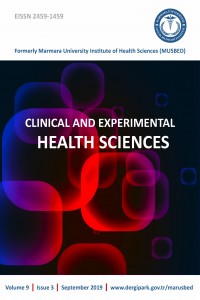Abstract
References
- 1. Arıkan İ, Metintaş S, Kalyoncu YZ. The Cardiovascular Disease Risk Factors Knowledge Level (CARRF-KL) Scale: A Validity and Reliability Study. Arch Turk Soc Cardiol 2009; 37:35-40.
- 2. Martell-Claros N, Galgo-Nafria A. Cardiovascular Risk Profile of Young Hypertensive Patients: The Open Joven Study. European Journal of Preventive Cardiology 2012; 19(3):534-540.
- 3. Turhan N. Health Prevention Strategies and Screening Programmes in Women and Men. J Med Sci 2008; 28(6):255-261.
- 4. Yeşildal N, Aslan D. Nutritional Advice in the Prevention of Cardiovascular Diseases. Sted. 2003;12(7):248-249.
- 5. Samur G. Nutrition in the Cardiovascular Diseases. Ankara: Sinem Printing House; 2006, pp.24-36.
- 6. Aparcı M, Kardeşoğlu E, Cebeci BC. Approach to Cardiovascular Disease in Primary Care Medicine. TAF Preventive Medicine Bulletin. 2007; 6(5):380-388.
- 7. Kerimoğlu D, Kın S, Şahin F, Leloğlu S, Elçin Öİ, Çırak N, Akın A. The periodic health checks (check-up) results of health centers between 2003-2006 in Hacettepe University. Hacettepe Medical Journal 2007; 38:159-166.
Abstract
Objective: In recent years, cardiovascular disease (CVD) and CVD-related deaths have been increasing in the young population in Turkey. Nursing students should be informed about CVD and should reduce their own risk of this disease. This study was conducted to determine the impact of the knowledge of CVD risk factors among nursing students on the results of risk assessments.
Methods: The population of study, which had a cross-sectional design, was composed of 587 students in nursing school at one university. The sample comprised 351 students who volunteered to take part in this study. The data were collected using the Cardiovascular Disease Risk Factors Knowledge Level (CARRF-KL) Scale, The Students’ CVD Risk Factors Information Form, a physician scale, a tape measure, a digital blood pressure monitor, a glucometer and cholesterol and triglyceride measuring devices.
Results: The majority of the students (77.2%) were female, and the mean age was 20.77 years. The CARRF-KL Scale scores of the participants were low. In a significant majority of the sample, the anthropometric measurement results, blood pressure, respiration rate, pulse rate, blood glucose level, cholesterol level, and triglyceride level were within normal limits. As the knowledge level of CVD risk factors increased among the students, the blood glucose and cholesterol levels decreased.
Conclusion: Although they were in the minority, some of the nursing students in the sample had an increased risk of CVD. Health screening programs should be performed more often at institutions that educate health professionals. Strategies for reducing the CVD risk in the risk students should be conducted, and these students should be monitored closely.
References
- 1. Arıkan İ, Metintaş S, Kalyoncu YZ. The Cardiovascular Disease Risk Factors Knowledge Level (CARRF-KL) Scale: A Validity and Reliability Study. Arch Turk Soc Cardiol 2009; 37:35-40.
- 2. Martell-Claros N, Galgo-Nafria A. Cardiovascular Risk Profile of Young Hypertensive Patients: The Open Joven Study. European Journal of Preventive Cardiology 2012; 19(3):534-540.
- 3. Turhan N. Health Prevention Strategies and Screening Programmes in Women and Men. J Med Sci 2008; 28(6):255-261.
- 4. Yeşildal N, Aslan D. Nutritional Advice in the Prevention of Cardiovascular Diseases. Sted. 2003;12(7):248-249.
- 5. Samur G. Nutrition in the Cardiovascular Diseases. Ankara: Sinem Printing House; 2006, pp.24-36.
- 6. Aparcı M, Kardeşoğlu E, Cebeci BC. Approach to Cardiovascular Disease in Primary Care Medicine. TAF Preventive Medicine Bulletin. 2007; 6(5):380-388.
- 7. Kerimoğlu D, Kın S, Şahin F, Leloğlu S, Elçin Öİ, Çırak N, Akın A. The periodic health checks (check-up) results of health centers between 2003-2006 in Hacettepe University. Hacettepe Medical Journal 2007; 38:159-166.
Details
| Primary Language | English |
|---|---|
| Subjects | Health Care Administration |
| Journal Section | Articles |
| Authors | |
| Publication Date | September 30, 2019 |
| Submission Date | July 5, 2017 |
| Published in Issue | Year 2019 Volume: 9 Issue: 3 |


